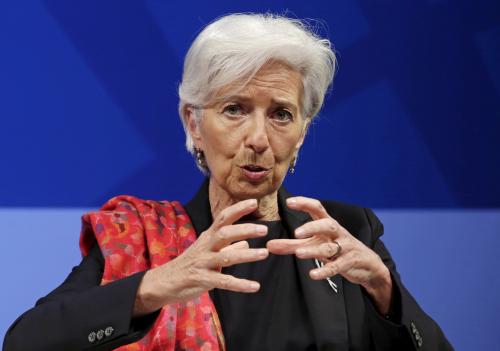Since the beginning of the Greek debt crisis, European creditors have constantly pushed Greece’s economy for a large “internal devaluation.” Equally, during the first program in 2010-12, they substantially leaned on the domestic political system to enforce and carry the cost of this adjustment, mainly impacting the productive sector of the economy, where it was less justified (read the full argument in my joint 2014 Brookings book with co-author Michael Mitsopoulos). Worse, the creditors led the government during the same time to increase taxes and cut wages without significantly embracing structural reforms. As a consequence, the program’s poor results have led to the private sector involvement in write downs of sovereign debt, known in the parlance as a haircut. This misguided application of internal devaluation has played havoc on the economy, the labor market, society, and, in the end, political developments. At the same time, political extremism has been on the rise, leading to a third program and a new colossal loan of tens of billions of euros (not decided exactly yet, although the initial estimation put the number close to 86 billion euros).
It is in the context of this third program that the current coalition government is to negotiate with the “institutions” (formerly “the troika”). These protracted talks, which started last summer, seem on the verge of concluding, with the end result being a menu of policy measures. It was this type of “solution” back in 2010-12 that led an earlier bitter program entailing pension cuts and oh-boy-not-again huge tax increases. Once word of these tax increases leaked out, thousands of small businesses and professionals decided to leave the country. As a result, prospects for businesses have worsened. This, surprisingly, has not seemed to frighten either the government or, more surprisingly, the creditors.
But as businesses are collapsing, both the prospect and success of the program are in question. How can one forecast an increase in public revenues through tax increases when businesses are either collapsing or just leaving the country?
Then, there is the most interesting part of the story. If the program fails in the following months, the government, to cement its domestic supporters, will certainly accuse the creditors, and especially the IMF, of being intransigent “neoliberalists” and austerity hawks, while creditors will most likely reiterate the story that Greece is an unreformed country. In other words, both parties may decide to kick the can down the road, but the problem will return sooner than they might realize.
Looking more broadly beyond the current painful negotiations, narrowing the difference between the Greek economy and other poorer EU nations vis a vis wealthier member states will require political integration and wealth redistribution policies across the EU, something most Europeans are unlikely to support, given their unwillingness to surrender national sovereignty. As I said in an Al Jazeera interview earlier this month, it’s too early to have, for example, a European parliament making decisions and controlling the ECB, since we are far from a form of pan European democracy. Fundamentally, there is still a fight between the ‘communitarian-think’ mindset and the ‘nationalistic-think’ stance, both in the minds of people as well as within the EU institutions.
The Brookings Institution is committed to quality, independence, and impact.
We are supported by a diverse array of funders. In line with our values and policies, each Brookings publication represents the sole views of its author(s).









Commentary
Greece and the creditors: A déjà vu agreement?
April 19, 2016